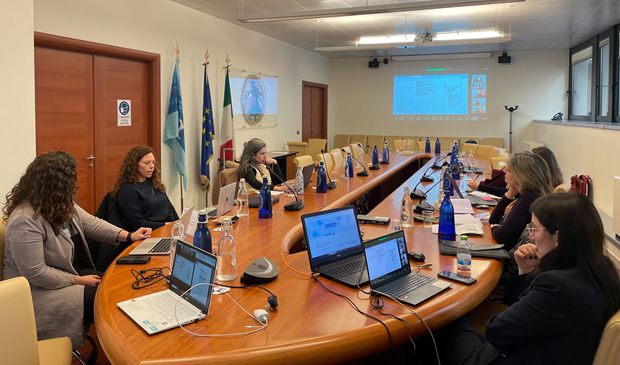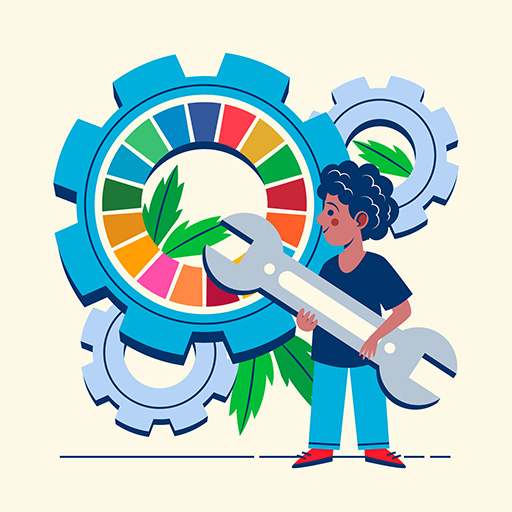NEWSLETTER – May 2024
We are continuing to see rich activities on a regional level to foster SDG-driven tech innovation.
One notable example was observed from the OECD Mission Action Lab, which launched its Community of Practice for mission and mission-oriented policy. The Community will run short sessions exploring diverse facets of mission implementation and governance to foster mutual learning experiences. On March 26, they held the first session on the Mission Community of Practice initiative, “Missions, when and why?” For more information on their session outputs, you can refer to their Miro board here.
Earlier this quarter, on March 5th, partners of the SDG-driven Tech Innovation Consortium convened its third in-person partners’ meeting in Rome.
As the project nears its conclusion, the Consortium discussed the final deliverables for the project, including:
- SDG-Driven Innovation Ecosystems Study – The consolidated research report, including the presentation with a summary of the main insights and the local ecosystem summary slides
- SDG-Driven Innovation Ecosystem Guidebook – Including a short and practical description of the methodology, insights, and best practices we identified. The purpose of this document is to be a useful handbook for ecosystem builders who wish to further strengthen and enrich their ecosystem.
- SDG-Driven Innovation Ecosystem Development Roadmap – A forward-looking, practical plan to support ecosystem builders in amplifying their ecosystem’s reach and impact through tech innovation. This plan is a consolidation of everything we have learned through this project, translated into actionable steps for ecosystem leaders.
- Impact of the project – Knowledge dissemination and communications efforts and their outcomes.

Figure 1 – Consortium partners discussing the final deliverable in Rome.
IFIE (Israel NAB)
A variety of initiatives led by the Israeli ecosystem stakeholders are driving progress in sustainability, climate technology, and responsible AI within the country’s tech sphere.
Pitango VC has introduced the ESG & Impact Knowledge Hub, a practical guide to ESG and Impact for startups. Committed to propelling the Israeli ecosystem towards global standards, the Hub aims to ensure that Israeli companies can compete with their global counterparts for customers. This dynamic resource caters specifically to startups of all sizes, offering pertinent information and resources across various impact areas, sustainability, climate tech, responsible AI, and the environment.
The Israel Innovation Authority’s International Climate-Tech Program is geared towards expediting the development and scaling up of groundbreaking climate technologies. By bridging climate challenges faced by global corporates and Israeli startups, and fostering international R&D collaboration with leading Climate-Tech hubs such as Sweden and Switzerland, this program aims to drive innovation. The International Climate Tech Call for Proposal comprises two programs: The MNC program, inviting Israeli companies to co-develop or pilot innovative solutions with global corporates in Climate Tech, and The Eureka Foodtech program for R&D&I Projects in alternative proteins.
Furthermore, to address the challenges faced by innovative Israeli technology companies during the conflict, the Innovation Authority offers a fast-track grant channel for investment in R&D projects. This initiative, operating within the framework of the R&D Fund, targets innovative technology companies with a short runway (up to 6 months) during the fundraising process. These companies, struggling to secure funds from existing investors due to the situation, can benefit from bridging financing until the next fundraising round.
Pears Challenge is now accepting applications from early-stage fintech ventures for its Field Validation program, a two-week opportunity that allows ventures to validate their solutions aimed at transforming lives in East Africa. Selected ventures will have access to the Pears Program network of partners and local innovators in Kenya and Tanzania, providing them with a competitive advantage as they test their concepts and assumptions on the ground.
MAZE (Portugal NAB)
Maze has collaborated with the project partners to define and prepare the final deliverables for the Consortium project, which aims to ensure ecosystem builders who wish to strengthen their SDG-aligned tech ecosystems have access to the necessary tools.
Other players in the Portugal ecosystem have demonstrated consistent efforts in fostering tech for SDGs and impact. On April 9th, Católica Lisbon School of Business and Economics organized the SDG Meetings: Future in Action event. This event brought together different actors from the ecosystem to discuss how to incorporate sustainability and the SDGs into the private sector practice and strategy. Margarida Anselmo, partner at Maze, moderated a panel focused on exploring the use of tech for SDG achievement, where she had the chance to briefly present the main findings and learnings of the SDG-Driven Ecosystem project.
Applications are now open for the 7th edition of the Blue Bio Value Acceleration Program and the 5th edition of the Blue Bio Value Ideation Program. The Acceleration Programme supports startups operating in the blue biotechnology sector, offering sustainable services or products that contribute to a healthier use of ocean bioresources. The ideation program assists innovative R&D projects that sustainably use marine bioresources, facilitating the transition from lab to market by connecting R&D project teams with business mentors. These programs, promoted by the Blue Ocean Foundation in partnership with the Blue Bio Alliance and powered by Maze, aim to drive innovation in the blue biotechnology sector.
DIGITALKS LISBOA took place from March 20th to 21st, attracting over 500 executives and professionals from the Portuguese digital economy. Focused on innovation, the event facilitated knowledge sharing and discussions on developing the digital market and business creation in various areas, including marketing, e-commerce, and AI. While not SDG-focused, the event addressed relevant topics on sustainability and ESGs.
In the coming months, Maze will continue collaborating with project partners to prepare final deliverables for this project, aimed at fostering the development of SDG-aligned Tech Ecosystems in Europe.
FAIR (France NAB)
The first half of 2024 has seen a flurry of events and research activities within the French SDG-tech innovation ecosystem.
Despite half of all startup launches occurring outside Paris, a staggering 80% of investments gravitate towards the capital. Addressing this disbalance, France Digitale has initiated the FD Tour, a series of events designed to connect investors from across France with regional startups, providing them with opportunities to forge valuable connections and secure funding. The FD Tour features workshops and speed dating sessions, such as the FD Tour International Women’s Day on March 5th, FD Tour Impact at ChangeNow on March 25th, and the event in Lille on April 11th (as per FD 100+ entrepreneurs).
Its upcoming events include July 4th in Saint Malo, September 18th for the FDDay in Paris—an annual gathering organized by France Digitale—and finally, November 6th, 2024 in Toulouse.
Moreover, in March, Mouvement Impact France and its partners (Impact Lab, Bpifrance le Hub and France Digitale) published the index, Impact 40/120, identifying and supporting the 40 most promising impact companies to become impact unicorns and the 120 companies to be closely monitored and supported in their acceleration. The index aims to help selected companies refine their strategy, raise capital and receive legal support to scale their businesses globally.
Another upcoming tech event to highlight is Viva Technology, scheduled from 22-25 May in Paris. One of this year’s key themes includes climate tech, with a focus on harnessing technology for resilient ecosystems as well as regenerative practices to address pressing issues on biodiversity, water resources, and agriculture.
Social Impact Agenda per l’Italia (SIA) (Italy NAB)
The SDGs-driven innovation framework has been garnering increasing attention within Italy’s impact ecosystem in recent times.
On April 5th, the Italy NAB convened in Venice for a two-day workshop titled “Global Challenges, Local Impact: towards Future-driven Alliances.” The event brought together Hubitat, the national network of local innovation hubs representing all Italian regions. Organised by the We Make Future Festival team and hosted by Fabbrica H3 and SerenDPT – Serenissima Development and Preservation through Technology, the workshop proved to be a collaborative platform for fostering impactful initiatives.
An intriguing revelation emerged during the workshop: the identification of impact-business models’ experimentation as a common thread within the ecosystem. This underscored the necessity for robust mapping and analysis tools to be collectively developed and shared.
Additionally, the Consortium project’s “SDG-Driven Tech Innovation Ecosystems Building Blocks framework” was briefly introduced by the NAB, as an innovative tool aimed at mapping and enhancing the impact investing ecosystem at both national and regional levels. Moving forward, efforts will be directed towards forging cross-sector partnerships to test shared frameworks and models.
In March, recognizing the urgent need to address the substantial investment gap hindering the accomplishment of Agenda 2030, the Italy NAB launched the SIA 2030 blog initiative. This platform serves as a space for the Italian impact investing ecosystem and beyond to delve into thoughtful analysis and propose solutions. A diverse array of insightful contributions is currently underway, promising to enrich the discourse on sustainable development and impact investing.
Many actors, organisations, and resources active in this space attest to the potential of making concrete gains in the SDGs by prioritising and aligning efforts. With continued collaboration and dedication, the Consortium look forward to making meaningful strides towards a more sustainable and inclusive tech ecosystem.
